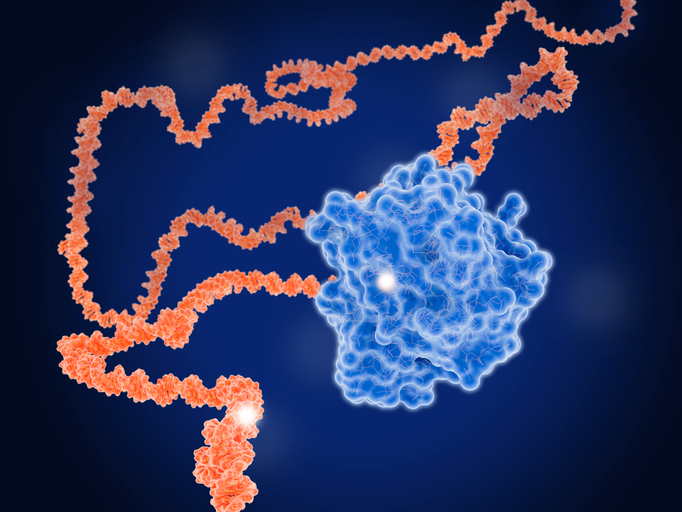Researchers at the Francis Crick Institute and Vividion Therapeutics have developed a new class of chemical compounds that selectively block a key molecular interaction responsible for driving tumor growth in a broad range of cancers. Their findings, published in the journal Science, detail how certain small molecules disrupt the interaction between the RAS protein and PI3Kα, providing a new pathway for treating RAS-driven tumors and HER2-positive cancers, without adverse effects.
“Given the RAS gene is mutated across a wide range of cancers, we’ve been exploring how to stop it interacting with cell growth pathways for many years, but side effects have held back the development of treatments,” said senior author Julian Downward, PhD, principal group leader at the Crick. “Our collaborative effort has overcome this challenge by targeting the PI3K and RAS interaction specifically, leaving PI3K free to bind with its other targets.”
RAS is one of the most frequently mutated genes in human cancers, with oncogenic mutations found in about 20% of tumors. In its normal role, RAS acts as a molecular switch at the cell membrane, relaying growth signals through pathways like MAPK and PI3K. But mutated RAS genes perpetuate its active state to continuously send signals that drive cell proliferation. While both MAPK and PI3K pathways are implicated in cancer progression, attempts to inhibit both simultaneously have encountered dose-limiting toxicity, resulting in side effects such as hyperglycemia and rashes.
Based on earlier research, the Crick and Vividion team zeroed in on the interaction between RAS and a specific catalytic subunit of PI3Kα called p110α that is critical for tumor growth but not necessary for normal tissue function.
“Genetic disruption of the RAS binding domain (RBD) of Phosphoinositide 3-kinase alpha (PI3Kα) impairs the growth of tumors driven by the small guanosine triphosphatase RAS in mice and does not impact PI3Kα’s role in insulin mediated control of glucose homeostasis,” the researchers wrote. “Selectively blocking the RAS-PI3Kα interaction may represent a strategy for treating RAS-dependent cancers as it would avoid the toxicity associated with inhibitors of PI3Kα lipid kinase activity.”
Using a chemoproteomics screening platform, researchers at Vividion identified a series of small compounds that irreversibly bind to Cys242 of PI3Kα near the RAS binding site. The Crick team, meanwhile, developed an assay to measure the effectiveness of these compounds in preventing RAS-PI3K binding without affecting PI3K’s interaction with other regulators like insulin. Mouse models with RAS-mutant lung tumors treated with these inhibitors showed halted tumor growth and no signs of hyperglycemia.
To uncover whether these compounds might have broader applications, the team also tested the compounds in HER2-overexpressing tumors in breast cancer. HER2 is another protein that activates PI3Kα, though typically independent of RAS. These studies showed tumor suppression similar to RAS-mutant models, indicating that the compounds may inhibit PI3Kα in HER2-driven cancers through a non-canonical mechanism.
“The strong effect of our Cys242 ligands on HER2 driven PI3Kα signaling and HER2 dependent tumor growth, by contrast is surprising and unexpected,” the researchers wrote. “These findings are consistent with the recently published characterization of BBO-10203… Despite these differences, both molecules have strikingly similar impacts on PI3Kα signaling across a range of cell types including both RAS mutant and HER2 overexpressing models and inhibit tumor growth in vivo without inducing hyperglycemia.”
The Crick and Vividion team further demonstrated that combining the new compound with other RAS inhibitors, such as MEK or KRAS-specific drugs, resulted in greater tumor suppression than any single agent. The team also found that in some instances blocking RAS-PI3Kα interaction could overcome feedback loops that limit the efficacy of KRASG12C.
“This discovery is a great example of how new discovery approaches can open up completely novel ways to tackle cancer,” said Matt Patricelli, PhD, chief scientific officer of Vividion. “By designing molecules that stop RAS and PI3K from connecting, while still allowing healthy cell processes to continue, we’ve found a way to selectively block a key cancer growth signal.”
Now, the optimized compound, VVD-159642, has entered a Phase I clinical trial (NCT06804824) to evaluate safety, tolerability, and preliminary efficacy in patients with cancers driven by RAS mutations or HER2 overexpression.
“Activation of PI3Kα through direct mutation or by mutation or overexpression of upstream signaling factors (e.g., KRAS, EGFR, HER2) is one of the most common oncogenic events in human cancers,” the researchers wrote. “To date, the clinical utility of PI3Kα selective kinase inhibitory drugs has been limited by a narrow therapeutic window. The discovery of molecules selectively targeting RAS and HER2 mediated activation of PI3Kα provides a promising new approach to more broadly impact patients with PI3Kα activated cancers.”

